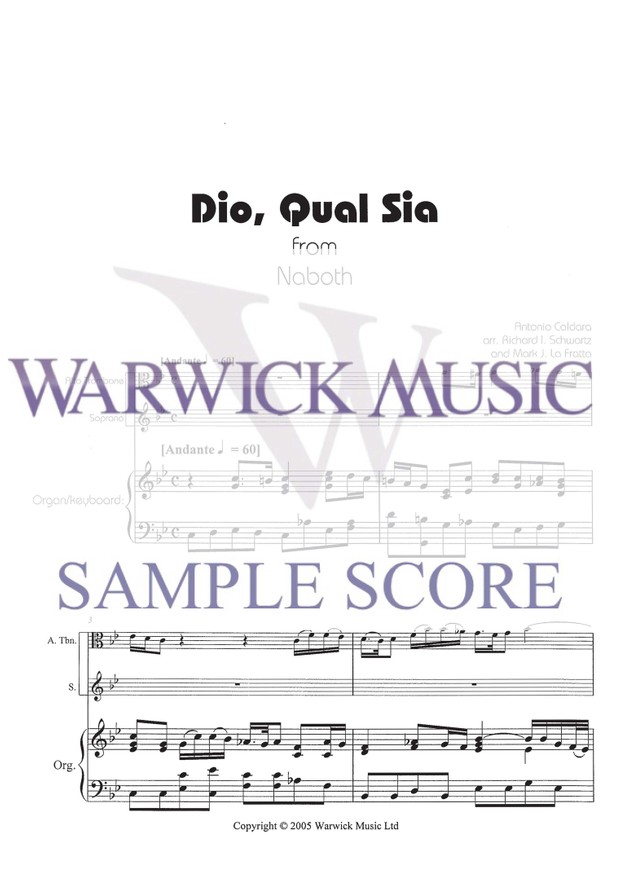£4.99


Caldara arr. A. Schwartz & M. Lafratta:Dio, Qual Sia from Naboth - Alto Trombone, Soprano & Keyboard
To download the sample score click on the link below
https://warwickmusic.egnyte.com/dl/wXoi9eEdZ9/TB715_sample_score.pdf_
Naboth, music by Caldara, text by Apostolo Zeno, was one of many "Sepolcro" oratorios commissioned by the Austrian Habsburg Royal family for a Holy Week performance during the culmination of Lent leading to Easter. These one-act oratorios often contained a solo aria with trombone obbligato performed at the high theological point in the Sepolcro. They were called "Sepolcro" because they were staged in front of a replica of the Holy Sepulchre (i.e. the tomb of Jesus in Jerusalem; in Italian, "San Sepolcro") temporarily constructed in one of the Royal chapels. Based on Biblical texts, they also were considerably expanded into a type of musical passion play.
Naboth was first performed in 1729 and repeated in 1738 according to the manuscript. It is based on the story of Naboth’s Vineyard from 1st Kings, Chapter 21. Naboth, the Jezreelite, owned a vineyard next to the palace of King Ahab of Samaria. Ahab offers to buy Naboth’s vineyard, but he refuses, as the Lord has forbidden him from giving away his ancestral heritage. When Ahab’s wife, Jezebel, hears of this, she arranges a plot to have Naboth killed. False accusations were made against Naboth, accusing him of denouncing both God and king. Despite his innocence, the trial is fixed by Jezebel and some nobles. Naboth is found guilty and stoned to death. In this aria, Naboth sings of his innocence and impending death. Knowing he has been trapped and that he is about to die, he places his hope and trust in the Lord as his only comfort. King Ahab, as a result, repents his sins.
This aria, Dio, qual sia la ria sentenza, was for alto trombone, bassoon, soprano, and basso continuo. No figured-bass symbols appear in the original manuscript. It can be found at the Österreichische Nationalbibliothek, Vienna (Mus.Hs. 18.133). The DaCapo is entirely written-out, making the manuscript ninety-six measures long. This edition represents a true DaCapo version, because Caldara even indicates a fermata for the end of a DaCapo performance of the aria. Measures 79-80 in the written-out section are certainly copyist errors, as the bass line in 79 does not correspond with the implied harmonies of the voice part, and the bass line in measure 80 occurs one measure early. The trombone in measures 15-16 contains only a descending scale, an error by the copyist as well. In this edition, that part is consistent with that of the voice part, and also measures 36-37.
This edition provides two performance versions. The first is for alto trombone, bassoon, soprano, and organ/keyboard, as was the manuscript. The second is for alto trombone, soprano, and organ/keyboard (assimilating the bassoon part). Translated, the text becomes: "O God, whether I stand convicted or whether my innocence prevails, You know it. In these extreme times, You alone are my comfort. I will not have the one who languishingly closed his eyes to me, or the one who restrained my tired limbs, or the chosen ones covered in perfumed oils, who with pitiful complaints come behind my back. But amongst insincere shouts and screams under a hailstorm of stones, I will rest, buried and dead. O God, whether I stand convicted or whether my innocence prevails, You know it. You alone are my comfort."
All purchases from our website are for a digital copy.
Warwick Music Publishing print sheet music is distributed globally and exclusively by Hal Leonard Europe. You can buy printed sheet music from a number of their approved retailers.
SKU: TB715
Composer: Antonio Caldara
Arranger: Ed. Dr. Mark J. La Fratta; Realized by Dr. Richard I. Schwartz
Difficulty: Intermediate
Instrumentation: Alto Trombone; Soprano; Keyboard
Range: Bb3-C5



